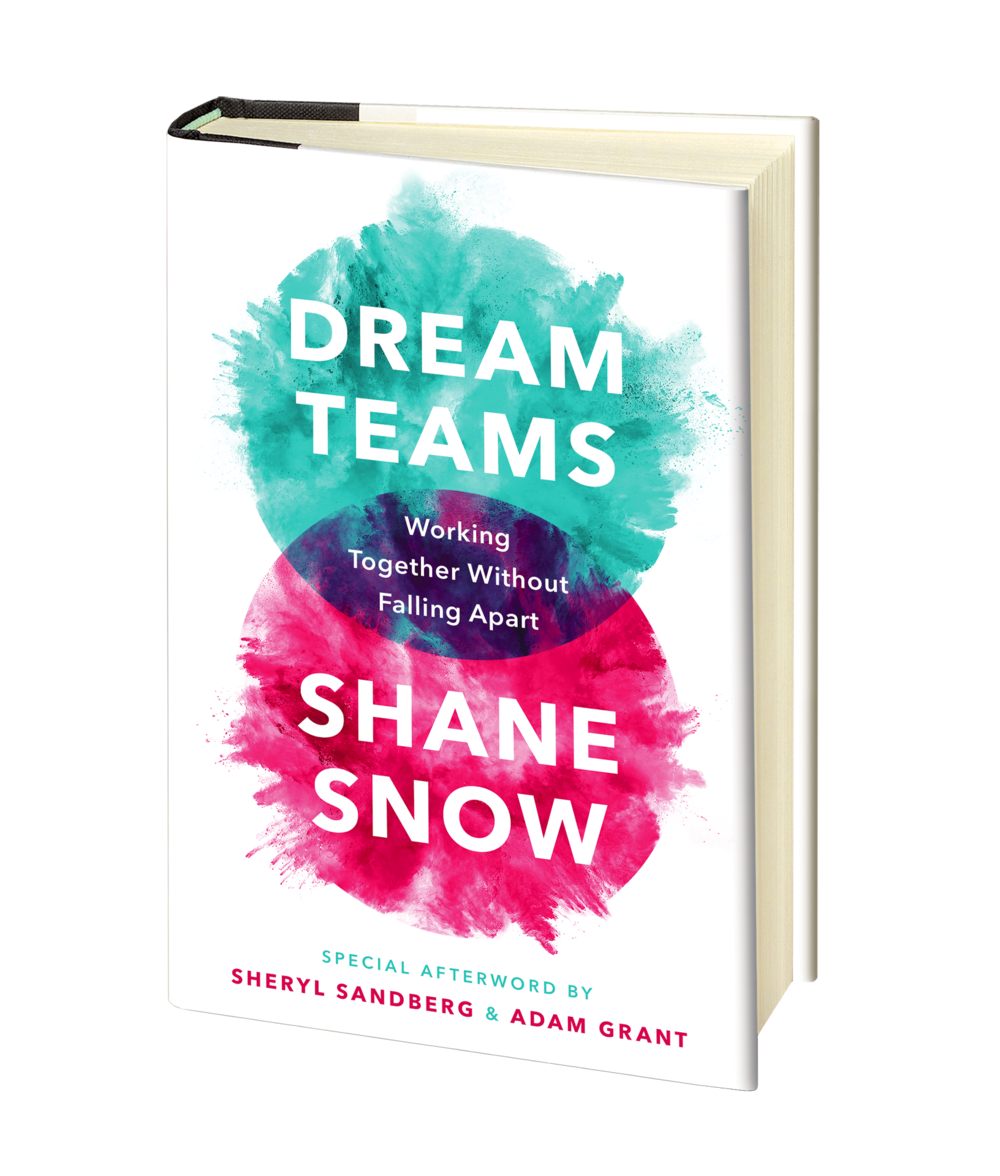
Shane Snow Q&A: How to hire your first employee
There’s an old proverb that goes something like, “If you want to go fast, go alone. If you want to go far, go together.”
As your business grows, you’ll face this choice. After months (or years) of being heads down on an idea by yourself, you’ll feel ready to call in the cavalry. But hiring is its own high-stakes art: get it wrong and it could set back your company significantly. Get it right, and it’s like rocket fuel.
So how does someone who has never hired before build the dream team?
That’s where Shane Snow comes in.

The founder of Contently and the author of “Smartcuts,” “The Storytelling Edge,” and the newly released “Dream Teams” spent the past few years researching a deceptively simple question: what makes a great team? And how can newbie team builders avoid common mistakes? We talked to Snow about his advice for first-time hirers and what dating websites taught him about solving problems.
Interview edited for length and clarity.
How is hiring your first employee different than building any other kind of team?
The first instinct that you’ll have will be to hire people like you. People who think like you. You know: the younger version of you that you see yourself in. Butthe main thesis of “Dream Teams” is that human beings are only as smart as the smartest person in the room. A group of people that sees things similarly or gets their inputs and information from people who are like them are only going to be as smart as the smartest person in that group.
This is how best practices turn to average practices. If we want to do groundbreaking work, it usually boils down to cognitive friction — which is when the friction between two very different ways of thinking collides and turns it into something that’s bigger.
How does cognitive friction result in better outcomes? Sounds like it would just lead to frustration.
The analogy that I use throughout “Dream Teams” is a mountain range. If you’re treading the same path as everyone else you’re going to end up on the same mountain peak that everybody else has gotten on.
Let’s pretend that the taller the mountain peak, the better the solution to the problem, and the better your life and business will be. Starting a business is like hiking around in the fog trying to figure out good solutions to problems, trying to find the best peak to climb. So we end up relying on those other people who have gotten somewhere good and follow them up there and do our best.
But breakthroughs happen when we find that mountain peak that no one has found before. It almost always happens when you combine different perspectives and different heuristics. That requires cognitive friction.
Want to build a business that enables you to live YOUR Rich Life? Get my FREE guide on finding your first profitable idea.
How do I determine whether that friction exists?
One part is your perspective, which is how you catalog the world and how you see problems. The angle from which you approach — psychologists basically say it’s how you encode in your own internal language — what you’re seeing and experiencing.
Basically it’s where on the mountain range you start when you get dropped off by the helicopter, where you start hiking from. And your heuristics are your approach to hiking around that mountain. So it’s your rules of thumb and your strategies.
So how can I avoid making mistakes when choosing my first employee?
Most of the time you’re building a team or you’re recruiting people. You’re looking to get wisdom for people who are like you. They all got dropped off in the same part of the mountain range but you really want two people who were dropped off on very different parts of the mountain range who then approach the climb from different ways. And if those people can actually mash their ways of exploring together, then those two people can become smarter than either one of them and they can reach a higher mountain peak. Hire someone who has a very different perspective on the world or on these problems, who’s going to work really hard, and who can push you to think differently than you do.
Now, don’t hire a ballet dancer if you’re working on marketing funnels, but if you’re choosing between two people and there’s the person where you’re like, “They’re going to be able to read my mind!” and there’s a person who used to be a ballet dancer and then got into marketing funnels, pick the ballet dancer. They encode the world a little bit differently.
All this is about setting up the probability that you’re going to be able to find a better mountain peak than you would on your own.
That’s hiring, but how else can I use this framework to be better at my business?
Pay attention to your inputs. When I was 21 years old, I was an intern at the startup and we’re selling pay per click management software. I was in charge of writing the ads on Google for our pay per click management software. And every day I’d look at all of our competitors for what they were doing and kind of take cues from their ads and they were doing the same thing with me. I didn’t make that leap forward.
You hit what people call a “local maximum.” Right?
Exactly. I didn’t make a leap forward until I, for whatever reason, though you can guess why, I encountered some online dating ads. I took the copy from the online dating ads and I threw it in the pay per click management.
Instead of “finding love” or whatever it was, I basically ripped off elements of those ads and suddenly my conversion rates jumped. And then two weeks later, all of our competitors who were ripping off my ads, no one knew that I got my inspiration from online dating.
By increasing the aperture of my inputs I was on a different mountain peak, maybe not a better one than I had, but something different.
But there needs to be some sort of North Star if you’re building something. So how do we encourage dissent but not just fight all the time?
You need a strong superordinate purpose, which is basically the thing that you are trying to accomplish, the way that you want the world to be different in the future. That’s the thing you want the most.
Basketball I think is a good example of, this is the point. The point of being on an NBA team is to win the championship. But sometimes your incentive actually as an individual player might be to get the most points, even if your team doesn’t win, which is problematic. But if you’re aligned around winning the game, you will make personal sacrifices in order to get there.
Your main criteria for when you’re recruiting is to find people who are caring about the cause, not people caring about the strategy.
But when I hire my first employee I want to move fast. And usually that means hiring people who run in my circles. How do I avoid that?
That’s what happened at Contently. But if you can spend an extra 50% of the time that it takes to hire to get people who bring something new that you don’t have, it’s worth it down the road. It’s sort of like the little switch on railroad tracks: for the first 50 feet after the track moves one degree, it’s pretty similar, but three years into your company that becomes a huge difference in making that decision early.
What if I don’t want to change the world and I just want a small profitable business?
If you’re working on something that’s already solved problems and not breaking new ground and you’re like, “I’m good!” Then yes. Copy what’s been done before. But I would question whether that’s what you really want to do. And also, you know, a year from now the world will change. Is that going to be a problem for you?
So, say I’m in. I want to hire someone to create that cognitive friction. How should I conduct my candidate search?
My personal opinion is that this is where storytelling really helps, so if you want to attract the kind of people who care enough that they will do anything to figure out how to make your thing successful, tell the story of why you’re doing this. And ask questions that get at people’s unique stories. My three favorites:
- What was a time in your life when you changed your mind about something you felt strongly about?
- What do you read outside of work?
- What’s something that you know how to do that most people don’t know how to do and how’d you learn that?
Figure out what are the things aside from just the job description that make them who they are and they’ll start work on day one with this implicit permission to be who they are.
The hard skills almost matter less because what they’re doing is almost certainly going to change.
Right. That’s where you want to set up from the beginning. Honestly this is the problem with the way we enshrine these business heroes like Elon Musk or Steve Jobs. They don’t need all these people who think differently and challenge them. Sure. But are you Elon Musk? Elon Musk is the smartest fucking man in the world.
Have intellectual humility to realize that you are going to get further if you allow people to poke you with a sharp stick to help you realize what you don’t realize.



